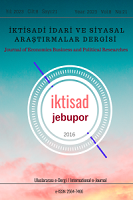Analysis of the Relationship Between Trade Openness and Inflation: Evidence from MIKTA Countries
Analysis of the Relationship Between Trade Openness and Inflation: Evidence from MIKTA Countries
Author(s): Turgay Ceyhan, Nazligul Gulcan, Samet GürsoySubject(s): National Economy, Supranational / Global Economy, International relations/trade, Financial Markets
Published by: Haci Mustafa Paksoy
Keywords: Trade openness; inflation; Kónya (2006) panel causality test;
Summary/Abstract: Foreign trade plays a key role in the development of a country's economy and international social relations. Accordingly, the increase and decrease in a country's trade openness directly and indirectly affects macroeconomic indicators. In short, it is important to know the expected relationship between trade openness and inflation for a country's economy. Investigating the relationship between trade openness and inflation is important in keeping inflation under control, along with foreign trade policy practices. On the other hand, the theoretical basis of the association between trade openness and inflation is known with the Romer (1993) Hypothesis. According to the Romer Hypothesis, it is argued that an increase in trade openness will negatively affect inflation. However, although there are findings supporting this theory for the studies done so far, there are empirical studies expressing the opposite. This study has investigated this relationship in MIKTA countries. Kónya (2006) panel causality test was used in the study using annual data between 1960 and 2020. In result of the paper, it is found that there is no causal linkage between trade openness and inflation in countries. These results do not coincide with the Romer (1993) Hypothesis.
Journal: İktisadi İdari ve Siyasal Araştırmalar Dergisi (İKTİSAD)
- Issue Year: 8/2023
- Issue No: 21
- Page Range: 327-338
- Page Count: 12
- Language: English

